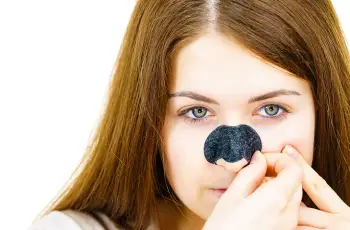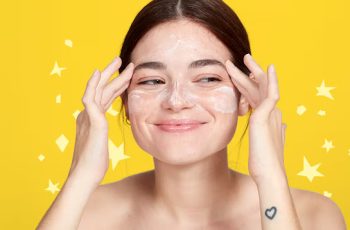
Hypochlorous Acid Spray Is the New Trendy Acne Treatment
If you’ve been searching for the latest acne treatment, you’ve probably heard of hypochlorous acid spray. This trendy new ingredient isn’t actually that new—it’s been showing up in skincare products for years—but it’s been gaining a lot of attention on #SkinTok lately.
We understand that you might be hesitant to add a new product to your routine, especially if acne is one of your main skin care concerns. Every routine is about finding a delicate balance that works for you. That’s why we asked dermatologists Azadeh Shirazi, MD, and Marisa Garshick, MD, to break down what hypochlorous acid is, what it does, and if it works. Read on to find out if it’s right for you.
What is Hypochlorous Acid?
“Hypochlorous acid is a substance that our bodies produce naturally in our white blood cells,” Shirazi explains. It’s an acid that our bodies produce that “has antibacterial and anti-inflammatory properties,” Garshick adds. It’s very popular in the skincare industry because of its antibacterial properties.
Hypochlorous Acid Benefits
Hypochlorous acid has a ton of benefits, treating everything from acne to wound healing. Here’s an overview of the benefits you can expect from incorporating hypochlorous acid into your daily routine:
Calming Redness and Inflammation: “Because it helps repair the skin, it can be used to…soothe redness and inflammation,” explains Garshick. If you’re looking to even out your skin tone and boost overall skin health, it might be worth incorporating it into your routine.
Fighting Acne: Yes, hypochlorous acid can treat breakouts, just like TikTok claims. Garshick notes that the antimicrobial properties make them “helpful for those who struggle with breakouts, and the spray formula makes them a great post-workout option.”
Healing Wounds: One of the more unexpected benefits is that you can use this ingredient to treat skin scrapes, cuts, and abrasions. “Hypochlorous acid is an effective microbe killer because its antimicrobial and anti-inflammatory properties make it a great choice for wounds and damaged skin,” explains Shirazi.
Decreasing Skin Sensitivity: Garshick says that the ingredient can ultimately repair the skin as a whole, so it can treat skin sensitivity. If you’re looking to reduce your skin’s sensitivity, consider adding a hypochlorous acid product to your daily routine.
Hypochlorous Acid Compared to Other Anti-Acne Ingredients
Compared to common anti-acne ingredients like salicylic acid or glycolic acid, hypochlorous acid “can disinfect the skin, reduce inflammation, and speed up the natural healing process, since bacterial colonization can hinder healing,” Shirazi explains. Hypochlorous acid “is not an exfoliant like glycolic or salicylic acid, and is gentler than other antibacterial ingredients like benzoyl peroxide,” she says. “It can also be safely used around the eyes.”
While hypochlorous acid is known for its antibacterial and anti-inflammatory properties, which help fight acne, “in general, people with acne can also benefit from using other anti-acne ingredients, such as retinoids, salicylic acid, and benzoyl peroxide,” adds Garshik. “Acne is related to sebum production, so using retinoids and salicylic acid is important to treat clogged pores.” Still, hypochlorous acid is a good option for “people with sensitive skin who may be irritated by other acne treatments,” she says.
Possible side effects of hypochlorous acid
“Because hypochlorous acid is gentle on the skin and does not cause irritation, it is generally safe for daily use without causing side effects,” explains Garshick. Shirazi agrees, but with one caveat: “High concentrations (500 ppm) of hypochlorous acid can cause skin irritation, which manifests as a red, itchy rash.”
The risk of side effects is low, making it ideal for those with sensitive skin or those who are hesitant to try new products.
Products formulated with hypochlorous acid
Many products on the market today contain hypochlorous acid, including facial sprays, creams, serums, and cleansers. Garshick notes that these include “Tower 28 Beauty’s SOS Daily Rescue, Prequel’s Universal Skin Solution Dermal Spray, and Loma Lux Eczemol Spray.” “SkinSmarts Acne Cleanser is an excellent hypochlorous acid facial cleansing spray,” adds Shirazi.
Application
“Hypochlorous acid can be used once or twice daily, typically after cleansing or throughout the day as needed,” says Garshick. As for how to incorporate it into your skincare routine, Shirazi recommends using it after cleansing and before moisturizing, just like you would a toner. “If you can’t wash your face right away, it’s also great after a workout,” she adds.
Conclusion
Hypochlorous acid is great for those with sensitive skin who are dealing with acne but would be irritated by stronger anti-acne ingredients. It’s also worth incorporating it into your routine if you’re active and enjoy a little tea after a workout to keep your skin healthy and clear. While it’s not recommended as a replacement for salicylic acid or glycolic acid acne treatments, it can be a useful addition to your routine.


